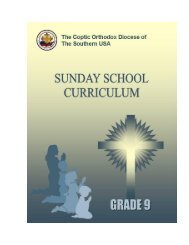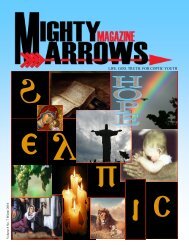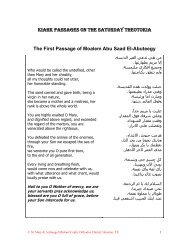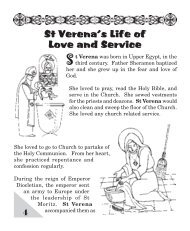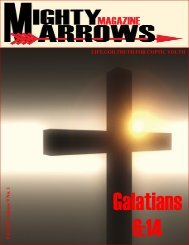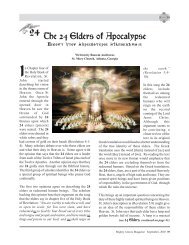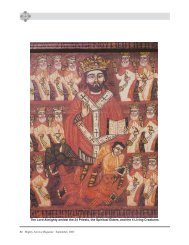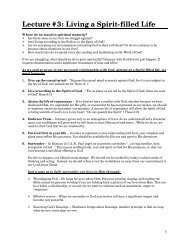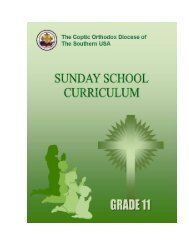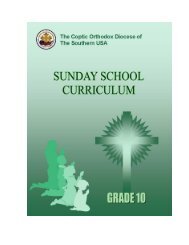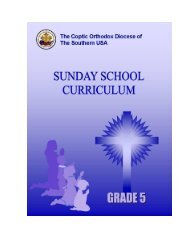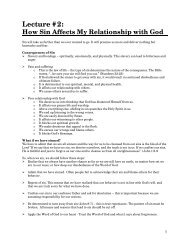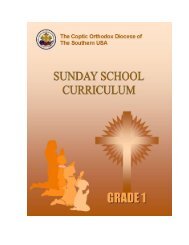Grade 12 - Coptic Orthodox Diocese of the Southern United States
Grade 12 - Coptic Orthodox Diocese of the Southern United States
Grade 12 - Coptic Orthodox Diocese of the Southern United States
You also want an ePaper? Increase the reach of your titles
YUMPU automatically turns print PDFs into web optimized ePapers that Google loves.
Sunday School Curriculum <strong>Grade</strong> <strong>12</strong><br />
C. Praying fervently for mercy<br />
At <strong>the</strong> end <strong>of</strong> every hour, <strong>the</strong> person repeats forty one times <strong>the</strong> words ―Lord have mercy.‖ By<br />
praying fervently, we know that <strong>the</strong> Lord will not return our prayers unanswered. Jesus underlined<br />
that in <strong>the</strong> parable <strong>of</strong> <strong>the</strong> unjust judge (Luke 18:1-7).<br />
D. Praying in accordance with God‟s Will<br />
If your prayers are in accordance with Cod‘s will, <strong>the</strong>n “<strong>the</strong> Lord will hear your prayer in <strong>the</strong> day<br />
<strong>of</strong> trouble and <strong>the</strong> name <strong>of</strong> <strong>the</strong> God <strong>of</strong> Jacob will keep you safe…” (Psalm 20:1-5).<br />
E. Lessons on how to pray<br />
The Psalm says, “Serve <strong>the</strong> Lord with fear and rejoice with tremble. Kiss <strong>the</strong> Son, lest He be<br />
angry, and you perish in <strong>the</strong> way, when His wrath is kindled but a little. Blessed are all those who put<br />
<strong>the</strong>ir trust in Him” (Psalm 2:11,<strong>12</strong>).<br />
F. There is an element <strong>of</strong> preaching in <strong>the</strong> prayers <strong>of</strong> <strong>the</strong> Agpeya<br />
This refers to didactic and preaching trend besides that <strong>of</strong> worship and contemplation. This<br />
complies with <strong>the</strong> advice <strong>of</strong> <strong>the</strong> apostle “but exhort one ano<strong>the</strong>r daily, while it is called „Today,‟ lest<br />
any <strong>of</strong> you be hardened through <strong>the</strong> deceitfulness <strong>of</strong> sin” (Hebrews 3:13).<br />
G. Being spiritually preoccupied all day long<br />
Most people remember <strong>the</strong> Lord at <strong>the</strong> start and at <strong>the</strong> end <strong>of</strong> <strong>the</strong> day. As for <strong>the</strong> rest <strong>of</strong> <strong>the</strong> day, it<br />
is occupied with conflicts and worries so that <strong>the</strong>re is no time for prayer. Therefore, our mo<strong>the</strong>r, <strong>the</strong><br />
Church, who is concerned about our joy and salvation, invites us to pray all day long by providing <strong>the</strong><br />
Agpeya, <strong>the</strong> Book <strong>of</strong> <strong>the</strong> seven canonical prayers.<br />
H. A healthy and spiritual meal<br />
One <strong>of</strong> <strong>the</strong> Church fa<strong>the</strong>rs likens <strong>the</strong> Agpeya, to a nourishing meal and goes on to say that it is <strong>the</strong><br />
attire <strong>of</strong> a wedding that qualifies us and directs our thoughts and feelings so that we can enjoy <strong>the</strong><br />
blessings <strong>of</strong> this invitation. This attire consists <strong>of</strong> a dress, a belt, and shoes: The dress stands for <strong>the</strong><br />
Lord‘s prayer, <strong>the</strong> belt stands for <strong>the</strong> prayer <strong>of</strong> thanksgiving, and <strong>the</strong> shoes stand for <strong>the</strong> prayer <strong>of</strong><br />
repentance.<br />
I. A dialogue with God<br />
―Hear me when I call, O God <strong>of</strong> my righteousness, You have relieved me in my prayer‖ (Psalm<br />
4:1).<br />
J. Countless spiritual benefits<br />
Through prayers based on <strong>the</strong> Agpeya, we learn to live a life <strong>of</strong> faith. Our hearts are filled with<br />
peace and security and we draw various spiritual lessons.<br />
V. The reasons that led <strong>the</strong> Church to use <strong>the</strong> Psalms in Prayers<br />
The Church has chosen to use <strong>the</strong> book <strong>of</strong> Psalms in all prayers for many reasons, some <strong>of</strong> which<br />
are:<br />
In <strong>the</strong> character <strong>of</strong> David <strong>the</strong>re is a combination <strong>of</strong> astonishing experiences, he was a<br />
shepherd, a great king, an inspired prophet, a saint, and a human being tried by temptations.<br />
These experiences find an echo in our psychological make-up and needs.<br />
The psalms are <strong>the</strong> Words <strong>of</strong> God conveyed to David by <strong>the</strong> Holy Spirit and this is what Jesus<br />
clarified by His own words, ―David being led by <strong>the</strong> Holy Spirit...‖ (Mat<strong>the</strong>w 22:43).<br />
The Psalms contain <strong>the</strong> element <strong>of</strong> thanksgiving, <strong>the</strong> language <strong>of</strong> angels and spiritual beings.<br />
192 AUGUST



